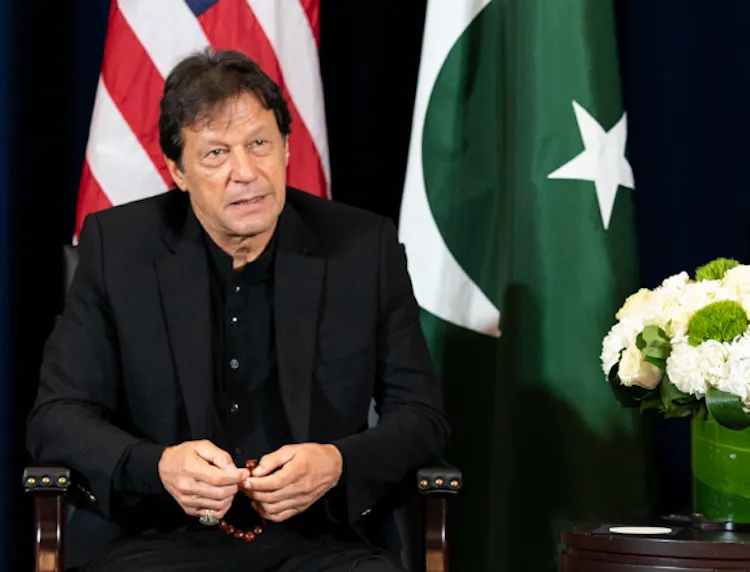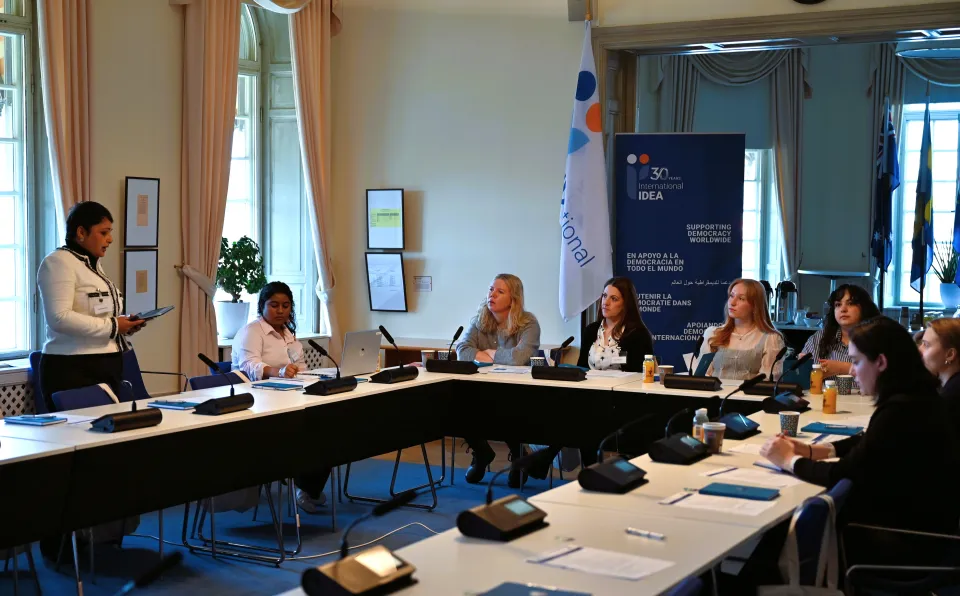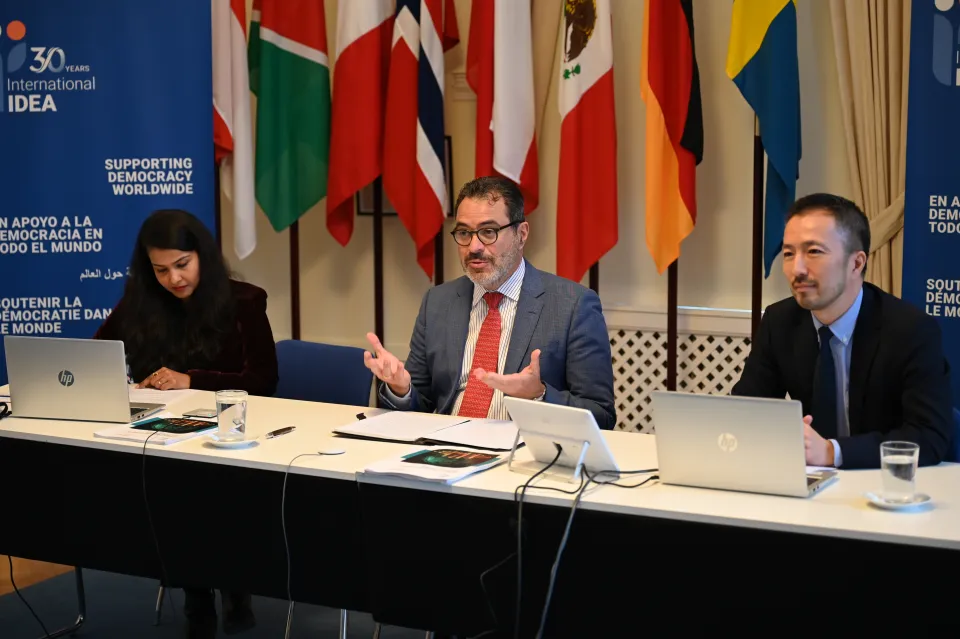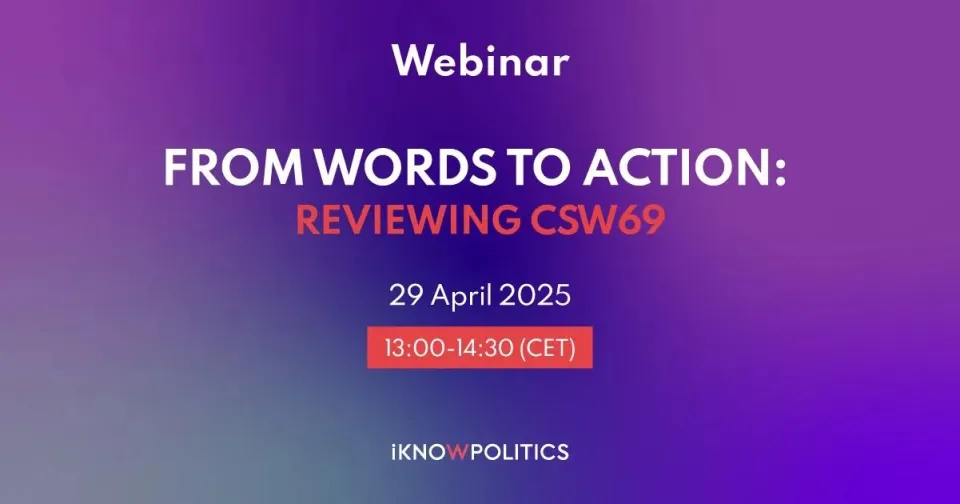Courts, power politics and parallels: Can Imran Khan hold on in Pakistan?

Disclaimer: Opinions expressed in this commentary are those of the author and do not necessarily represent the institutional position of International IDEA, its Board of Advisers or its Council of Member States.
The high-stakes contest between former Prime Minister Imran Khan, the Pakistani government and its powerful military establishment has become one of the most serious political crises in Pakistan's recent memory—not a small feat for a country known for its tumultuous politics. Every day comes with a new twist or turn: civilians to be tried in military courts, Khan himself being dragged from an Islamabad courtroom, rumours of assassination plots, and threats to ban the party of the most popular politician in the country outright.
The road to the current deadlock began in November 2022, when Khan’s Pakistan Tehreek-e-Insaf (PTI) opposition party moved to force snap regional elections in two key provinces it was certain to win. In violation of the constitution and a direct order from Umar Ata Bandial, the Supreme Court Chief Justice, the government repeatedly delayed elections far beyond the constitutionally-mandated 90-day window, and the PTI and its allies attempted further unconstitutional steps to force the government to comply. As has too often been the case in Pakistani history, the military has fostered the political chaos in order to expand its power.
While it seems like a minor part of the story, it was arguably Chief Justice Bandial’s intervention—done via a suo motu decision, a procedure allowing a chief justice to intervene in a matter without an outside party bringing a case to the court – that epitomizes the conflict. Bandial attempted to short-circuit the conflict, but in bypassing more deliberative and inclusive forms of adjudication, his decision did little to move the governing Pakistani Democratic Movement (PDM) and only set the stage for further escalation of the crisis.
Both Khan’s convention-bucking arc and Bandial’s suo motu move call to mind the actions of Iftikhar Muhammad Chaudhry, whose three tumultuous terms as Pakistan’s chief justice between 2005 and 2013 offer a useful frame through which to consider the current tensions. Long a supine institution that provided post-facto legal justifications for undemocratic transitions of power, the Supreme Court underwent a drastic change under Chaudhry, who—like Khan—owed his rise to national power to elite-military establishment. Also like Khan, Chaudhry was able to leverage tangible mass popularity into an escape from establishment control.
Parallels in Pakistan’s recent past
The arc of Chaudhry’s rise to power has parallels with Khan’s. Both men rose to the heights of the Pakistani elite with the active backing of the military elite. In Khan's case, the military tilted the 2018 election in his favor when they saw in him an amenable civilian leader. Before him, Chaudhry had the support of then-President and Chief of Army Staff Pervez Musharraf. Once in power, Chaudhry instead became known for bold, public-interest judicial activism, largely carried out through the liberal and controversial use of his own suo motu decisions. In 2007 and 2008, when Musharraf’s political career came to an end after an attempt to force Chaudhry’s removal backfired, Chaudhry was able to mobilize popular and political support to force Musharraf’s successor to reinstate him to the Court. Similarly, Khan cooperated closely with the military for the first few years as prime minister, before a fight over the balance of civilian-military power in the early 2020s led him to openly challenge the military leadership. Khan has continued his criticism since being removed from power in a no-confidence vote on 10 April 2022, a process he has directly accused then-Chief of Army Staff Qamar Javed Bajwa of orchestrating.
The drivers for Chaudhry’s judicial activism—which is commonly referred to by legal scholars as the “judicialization” of politics—were rooted in popular discontent with Musharaff’s “economic liberalization coupled with political illiberalism”, providing a base of popular support for aggressive public interest litigation. But it was also personality-driven: especially towards the end of his term, Chaudhry’s growing number of critics accused him of being driven primarily by self-aggrandizement. To make matters worse, his headline-grabbing efforts to strengthen the judiciary’s power over parliament had the unfortunate consequence of weakening both before the military. Khan, whose 2018 rise to power followed decades of folk hero status, has been dogged by similar allegations of entering politics “out of a misplaced sense of entitlement, searching for a post-retirement purpose in life.”
Populism or power politics?
Whatever both men's motivations, together they represent a point of departure in Pakistani political history, where shifts in the balance of power were rooted in some semblance of popular demand, rather than purely a result of elite-military machinations.
As commentators have extensively documented, Pakistan’s current crisis lacks clear-cut heroes. Despite the judicial focus on Khan’s case, for most Pakistanis the courts remain slow, overburdened, and nonresponsive institutions that neither deliver justice nor check private or executive power. And while Khan has publicly challenged the military establishment more directly than any politician in recent memory, his campaign has become elite brinksmanship in populist clothing as Khan seeks to regain the military’s grudging support, not remove it from politics.
While a military-supported return to power would certainly be good for Khan—just as his far more likely military-assisted removal from the political sphere would benefit the Pakistan Democratic Movement (PDM)—it is only through a removal of the military from politics that Pakistan can address its overlapping crises. As Indonesia’s post-Suharto marginalization of its long-dominant military shows, a united civilian political class is necessary for dislodging the military from politics. This is a long shot, as at the time of writing the military is successfully forcing key PTI leaders out of the party and even the Supreme Court is divided against itself. Despite the upheavals of the last year, the Pakistani elite and military are likely to muddle through. But it is uncertain at what cost to the people of Pakistan.




